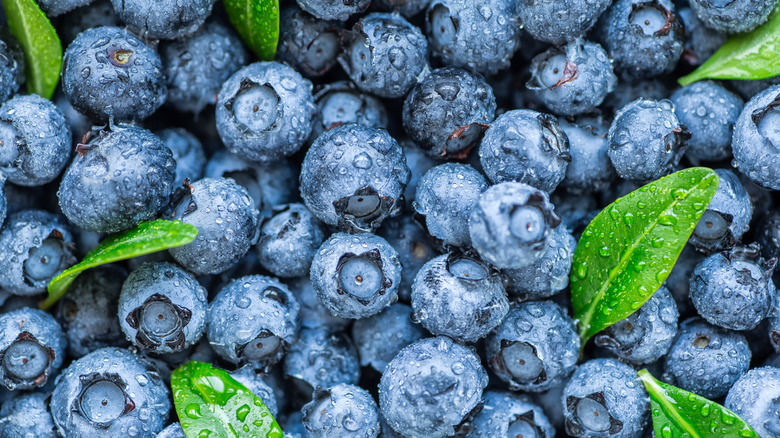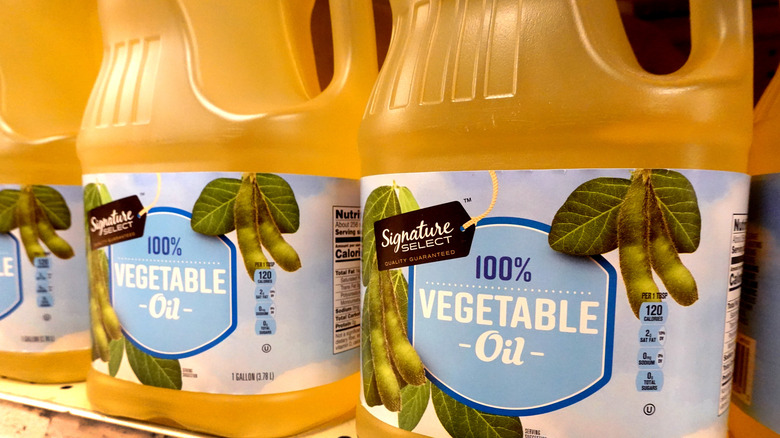6 Foods To Eat And 6 To Avoid For Mental Health
Poor brain or mental health is on the rise, a major global public health concern that affects millions of people (via Psychology Today). Neurogenerative diseases such as Alzheimer's disease and mood disorders such as depression are becoming increasingly commonplace.
Among the lifestyle changes that can impact brain health, diet is near the top of the list. Evidence from studies suggests that certain dietary patterns and specific foods can improve brain health, while other eating habits and foods can impair brain function. All the healthy diets linked to better brain health have several features in common (per a 2021 review in the International Journal of Molecular Sciences). They are low in sugars, saturated fat, and processed foods, while providing generous amounts of foods rich in polyphenols. Polyphenols are important bioactive compounds that mediate many of the health-enhancing effects of these plant foods by protecting nerve cells from free radical damage (oxidative stress) and by suppressing nerve inflammation that contributes to poor brain function.
The gastrointestinal tract also plays a major role in brain health via the gut microbiota which "communicates" with the brain. A healthy diet can improve the gut microbiota composition which, in turn, produce hormones, neurotransmitters and various metabolites that reduce nerve inflammation and improve brain health.
If you or someone you know needs help with mental health, please contact the Crisis Text Line by texting HOME to 741741, call the National Alliance on Mental Illness helpline at 1-800-950-NAMI (6264), or visit the National Institute of Mental Health website.
Eat salmon
Few foods pack more nutritional punch than salmon, reports Healthline. Salmon is popular both for its great taste and wealth of nutrients, including vitamins, minerals, healthy fats, and high-quality protein. Salmon is a particularly good source of vitamin B12, potassium, cancer-protective selenium, and a powerful antioxidant pigment called astaxanthin that confers the pink-red color of salmon. Nevertheless, salmon's claim to fame regarding health benefits, including mental health, is its rich content of the omega-3 fatty acids EPA (eicosapentaenoic acid) and DHA (docosahexaenoic acid).
According to a 2020 review in Nutrients, supplemental EPA and DHA derived from seafood may improve brain and mood health. Studies show that individuals who lack omega-3s in their diet have a greater likelihood of developing various mental health conditions such as attention deficit hyperactivity disorder (ADHD), autism, bipolar disorder, depression, and suicidal thoughts. The brain has a high concentration of EPA and DHA which play important functional and structural roles. As components of cell membranes, omega-3s make the membranes more fluid and pliable and less rigid. As a result, critical neurotransmitters can more readily bind to their receptors in brain and nerve cell membranes, and thus, function better. EPA and DHA are well-recognized for their anti-inflammatory effects throughout the body. In the brain, these omega-3s suppress inflammation that decreases neurotransmitter levels in the brain. Neurotransmitters transmit electrical signals from one nerve cell to another, and are vital for brain/nervous system function.
Avoid Coca-Cola
The sad truth is that drinking Coca-Cola is one of the best ways to impair brain function. Coke and other regular sodas are basically sugar water. According to the Centers for Disease Control and Prevention (CDC), sugary drinks such as Coke contribute more added sugar to the American diet than any other food or beverage. A 12-ounce regular soda contains 10 teaspoons of sugar (about 40 grams). Per the dietary guidelines, this amount of sugar in one soda alone nearly meets the maximum amount of sugar (12 teaspoons) allowed per day for all foods and drinks combined for a person eating a 2,000-calorie diet.
While it is well-established that sugary drinks increase the risk of obesity, type 2 diabetes, and heart disease, can they harm the brain as well? Per a 2017 study in Alzheimer's & Dementia, drinking too many sugary beverages can shrink your brain. Compared to participants drinking less than one sugary beverage per day, those who drank greater amounts were found to have memory loss and smaller brain volume, especially in the hippocampus, the area of the brain involving memory and learning. These adverse effects on the brain caused by sugary drinks have a striking resemblance to markers of preclinical Alzheimer's disease, the stage of the disease occurring long before symptoms are apparent. Since sugary drinks are linked to cardiovascular disease, it was suggested that circulation problems stemming from excess sugar may also contribute to brain damage.
Eat eggs
The egg is a nutritional powerhouse of many nutrients including essential amino acids, B vitamins, vitamin A, vitamin D, and iron (via a 2017 comprehensive review in the Journal of the American College of Nutrition). Considering that around 20% of Americans eat whole eggs on a given day, they are a major dietary source of choline, as well as the carotenoid lutein. Both choline and lutein can enhance cognition and potentially prevent age-related cognitive decline.
Among its various functions in the body, choline is precursor for the formation of acetylcholine, a neurotransmitter that plays an essential role in learning, memory, and attention. It is also incorporated into cell membranes as phosphatidylcholine, a molecule that contributes to membrane fluidity, which is vital to cellular functions. Higher intakes of choline during pregnancy have been associated with a lower risk of birth defects and better cognition in the child. Moreover, several phospholipids that contain choline have been verified as biomarkers of cognitive impairment and Alzheimer's disease.
Lutein is best known for its eye benefits, particularly in the prevention of age-related macular degeneration. Since the eye is an extension of the central nervous system (including the brain), it unsurprisingly affects brain health as well. Lutein forms part of the macular pigment of the eye, the density of which reliably correlates with lutein concentrations in the brain. As with choline, adequate intake of lutein during mid- to late adulthood may protect against age-related cognitive decline. This may be due to its antioxidant and anti-inflammatory activity in the brain.
Avoid white bread
While white bread and other refined carbohydrates have long been linked to obesity and metabolic disorders such as insulin resistance, they have a negative impact on brain function as well (via a 2018 review in Current Opinion in Clinical Nutrition and Metabolic Care). Chronic consumption of diets rich in refined carbohydrates impairs cognitive functioning before the onset of weight gain and even without weight gain. The extent to which carbohydrates are refined and nutrient-depleted is more closely tied to cognitive damage than the relative amount of carbohydrates in the diet.
The adverse effects of refined carbohydrates have a particularly profound impact on the part of the brain responsible for memory, attention, and the ability to control impulsive responses. People who are genetically predisposed or have metabolic or inflammatory disorders are more likely to develop cognitive impairment from overeating refined carbs. Refined carbs are especially harmful to the developing brain (i.e., during prenatal, juvenile, and adolescence periods). Some potential mechanisms that underlie the carbohydrate-brain connection include high blood sugar, insulin resistance, high blood levels of cholesterol and triglycerides, and out-of-control inflammation.
Eat blueberries
Owing to their multiple health benefits and great taste, blueberries continue to be in high demand (via a 2021 review of studies published in Biomolecules). While this "superfood" is known for its ability to help prevent major diseases (e.g., cardiovascular disease, diabetes, and cancer), blueberries are becoming increasingly recognized as a potent brain food as well. Blueberries are a rich source of polyphenols, most notably anthocyanins which impart the deep blue color to blueberries. These polyphenols have powerful antioxidant and anti-inflammatory properties which mediate the neuroprotective effects of blueberries.
Studies have shown that regular consumption of blueberries can slow the development of neurodegenerative disorders (e.g., Alzheimer's disease, Parkinson's disease) as well as brain aging. The brain is very metabolically active with a high oxygen demand. Thus, it is especially vulnerable to oxidative stress (free radical damage), which drives inflammation. The high concentration of antioxidants in blueberries can suppress these adverse effects and enhance brain performance by regenerating new nerve cells and by improving communication between nerve cells. Blueberries have also been shown to improve learning and memory in children and reduce depressive symptoms in older adults.
Blueberries should be eaten on a regular basis as part of a healthy lifestyle (per Rutgers). Improve your brain health by adding blueberries to cereal, smoothies, salads, or desserts for dinner.
Avoid vegetable oil
Outside of Mediterranean countries where olive oil is king, oils used for cooking are primarily vegetable oils rich in omega-6 polyunsaturated fatty acids (PUFA), including canola oil, soybean oil, sunflower oil, and corn oil (via a 2020 review in Advances in Nutrition). In the United States, consumption of vegetable oil has increased by a factor of 1,000, primarily since 1960 when the prevalence of chronic inflammatory disorders (e.g., obesity, type 2 diabetes, nonalcoholic liver disease) began to increase as well. While omega-6 PUFA have essential roles in the body, excessive consumptions can cause harm.
Deep-frying with theses unstable vegetable oils generates hydroxynonenal, a toxic compound which causes degeneration and death of various cells in the body including nerve cells in the brain. Moreover, omega-6 fatty acids from vegetables oils are incorporated into the brain and are highly susceptible to oxidation (rancidity) and further generation of hydroxynonenal. Toxic hydroxynonenal has been implicated as the true culprit underlying the death of nerve cells seen in Alzheimer's disease. For example, hydroxynonenal is increased in association with amyloid-beta and tau proteins (hallmarks of the disease) in the brains of people with Alzheimer's disease.
Americans consume more soybean oil (e.g., in fast food frying and packaged foods) than any other edible oil (per the University of California). However, soybean oil is not good for mental health. In a mouse study, soybean oil caused around 100 genes in the hypothalamus of the brain to malfunction. For example, due to altered gene expression, levels of oxytocin (a feel-good hormone) declined.
Eat yogurt
Since the gut has its own nervous system and many of the identical neurotransmitters produced in the brain, it has been dubbed the "second brain" (via Harvard Health Publishing). Changes in the levels of some of these neurotransmitters (e.g., serotonin, dopamine, and gamma-aminobutyric acid) can influence mood disorders. The gut-brain connection is clearly evident, for example, when a person who is stressed or upset experiences an ulcer, loss of appetite, or diarrhea. Conversely, bowel conditions such irritable bowel disease can aggravate mental disorders such as anxiety or depression.
Brain function may also be impacted by the gut microbiota via several mechanisms including the bacterial secretion of neurotransmitters and other signaling molecules (via a 2022 study published in Frontiers in Nutrition). Yogurt and other fermented dairy foods contain probiotic bacteria such as Lactobacillus that can exert beneficial effects on mental health by helping to correct imbalances between healthy and harmful bacteria in the gut. In a small sample of university students, consumption of yogurt (as well as cheese) was associated with lower levels of anxiety.
Avoid beef jerky
According to Johns Hopkins, beef jerky and other processed meats may contribute to mania, an abnormal mood state typically associated with bipolar disorder and marked by hyperactivity, euphoria, and insomnia. People experiencing manic states may become delusional and are often hospitalized. Chemicals used as preservatives in cured processed meats known as nitrates are believed to be the culprits. Nitrates have also been associated with some cancers and other neurogenerative diseases as well.
Research has shown that people hospitalized for mania were 3.5 times more likely to have a history of eating meats with nitrates than those without a psychiatric disorder (via Johns Hopkins). This link between nitrates and mania was further explored in animal experiments. Rats feeding on nitrate-containing beef jerky (equal to one beef jerky stick or hot dog) every other day became hyperactive and suffered from irregular sleeping patterns. In a follow-up experiment, rats remained symptom free after eating nitrate-free jerky.
The gut microbiota may also play a role in mania. Compared to the control rats, different patterns of gut bacteria were identified in the rats eating meats with nitrates. In people with bipolar disorder, the likelihood of rehospitalization in the 6-month period following a manic episode was less in those given a probiotic beforehand. Probiotics are live organisms that can favorably change the bacterial population in the gut.
Eat dark chocolate
While dark chocolate is mostly noted for being heart-healthy, this popular treat is brain-healthy as well, reports Healthline. By increasing blood flow to the brain, cocoa (used to make chocolate) has been shown to improve cognitive performance in verbal learning, attention, and memory in young adults. In older adults, cocoa may help prevent the progression of mild cognitive impairment (KCI) to dementia.
The same flavonoids (plant chemicals) found in fruits and vegetables are also contained in dark chocolate and are responsible for its health benefits (via a 2020 study published in the journal Nutrients). Healthy young adults who consumed a standard 35-gram 70% cocoa dark chocolate bar performed better on a word recall test than a control group eating a low-flavonoid white chocolate bar. Over the course of seven trials, participants eating the dark chocolate were able to recall 17 more words two hours later relative to the white chocolate group.
In a study published in a 2016 edition of Nutrition and Healthy Aging, adults who consumed a high-flavanol cocoa drink for 12 weeks resulted in cognitive improvements coincident with a significant increase in serum levels of brain-derived neurotrophic factor (BDNF). BDNF is an important protein that supports the growth and survival of nerve cells.
Go easy on the alcohol
While it's well-established that excessive alcohol consumption can poison the brain, even moderate drinking (one daily drink for women and two drinks per day for men) may lead to brain atrophy or shrinkage (via Harvard Health Publishing). Let's define a "drink" as 12 ounces of beer, 5 ounces of wine, and 1.5 ounces of 80 proof spirits. Over a 30-year period, alcohol intake and cognitive performance were measured in over 500 adult participants with tests of memory, reasoning, and verbal skills. MRI scans of the brain were also per performed upon completion of the study. The degree of brain shrinkage was dose dependent. Compared with nondrinkers, moderate drinkers were three times more likely to have shrinkage of the hippocampus (the area of the brain where memory and reasoning takes place), while there was a 6-fold increased risk among those who drank four or more drinks per day. Cognitive performance was affected only in heavy drinkers who experience impaired word recall ability.
However, a Harvard researcher who found similar correlations in a separate study noted that brain shrinkage improves when people stop drinking, suggesting that shrinkage may actually be due to fluid shifts rather than atrophy of brain cells. In any case, moderate drinkers should consider other factors, e.g., moderate drinking is heart-healthy and may reduce the risk of gallstones and diabetes. On the other hand, women have a slight increased risk of breast cancer over a lifetime with only one drink per day.
Drink coffee
Coffee, like Coke, is a hugely popular beverage all over the world. But unlike Coke, coffee is good for the brain (via a 2021 study published in Molecular Psychiatry). In the short term, coffee and caffeine have been shown to improve attention, mood, memory, vigilance, dexterity, and physical endurance. In the long term, both observational and animal studies have suggested that coffee and caffeine can protect against the development of Alzheimer's disease and other neurodegenerative disorders, as well as mental disorders such as depression.
Researchers use functional MRI imaging (fMRI) to measure brain activity in coffee drinkers. Compared with non-coffee drinkers, those who drink coffee regularly have been shown to have decreased functional connectivity of certain brain networks as mapped by fMRI. This is actually beneficial. Decreased functional connectivity in the brain is associated with increased alertness and motor control (regulation of movement). However, the stimulating effects of caffeine are dose-dependent (per a 2016 review of studies published in Neuroscience & Biobehavioral Reviews). While moderate doses (100 to 300 milligrams) are beneficial for improving alertness and reaction time, higher doses (greater than 400 milligrams) are often linked to increased anxiety. In terms of coffee, moderate caffeine intake equals about 1 to 3 cups, while high caffeine intake amounts to over 4 cups of coffee (via the FDA).
Avoid charred BBQ
Barbequing of foods at very high temperatures results in greater production of toxic compounds known as advanced glycation end products, or AGEs (via Life Extension). The browning effect (especially charring) associated with foods that are barbequed results from the reaction between sugars (and certain fats) with proteins that causes the formation of AGEs. These toxic AGEs can accumulate in many tissues and organs such as the skin, eyes, brain, nervous system, and arteries. They promote chronic inflammation and contribute to weight gain, insulin resistance, and diabetes. High levels of dietary AGEs gave also been linked to cognitive decline and faster loss of memory and attention (via a review of studies published in a 2014 edition of Mechanisms of Ageing and Development). AGEs also drive the buildup of beta-amyloid plaques and tau proteins in the brain — both telltale signs of Alzheimer's disease.
The good news for BBQ lovers is that the formation of AGEs caused by charring meats can be minimized by using marinades, per Life Extension. Before grilling, marinate your meat with blends of olive oil, apple cider vinegar, garlic, mustard, lemon juice, or dry wines.













